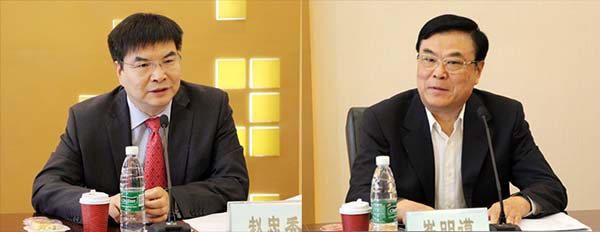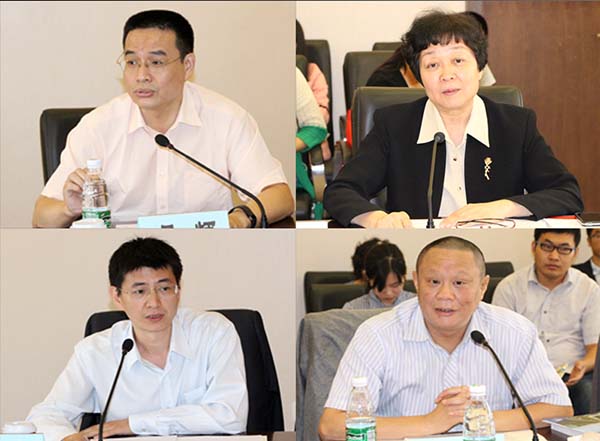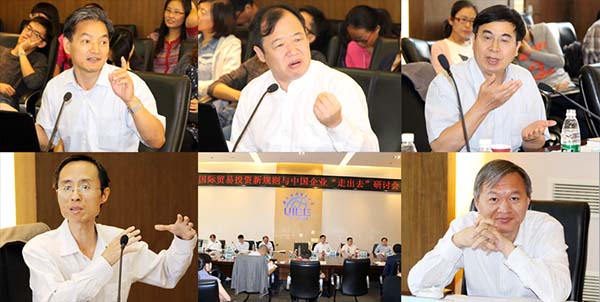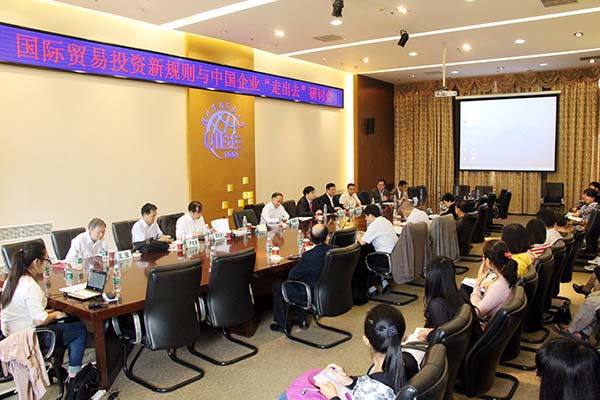Sponsored by the School of International Trade and Economics of the University of International Business and Economics and the China International Economic Cooperation Association, organized by the FDI Research Center of the University of International Business and Economics, the “Seminar on the New Rules of International Trade and Investment & Chinese Enterprises’ Going Global” was successfully staged in our university on September 27, 2014. The seminar was one of the 60th anniversary celebration activities of the School of International Trade and Economics. It had invited nearly 20 well-known experts and scholars in this field. The conference was chaired by Professor Hong Junjie, Dean of the School of International Trade and Economics.


The experts and scholars present included: Zhao Zhongxiu, Vice President of the University of International Business and Economics, Cui Mingmo, President of the China Society for International Economic Cooperation, Zhang Yunling, Director of the International Research Office of the Chinese Academy of Social Sciences, Guo Kesha, Deputy Director of the Department of Macroeconomic Affairs of the Research Office of the State Council, Wu Pin, Deputy Director of the Policy Research Office of the Ministry of Commerce, Yao Zhizhong, Researcher and Deputy Director of the Institute of World Economy and Politics of the Chinese Academy of Social Sciences, Bi Jiyao, Director of the Institute of Foreign Economics of the Institute of the Macroeconomic Research Institute of the National Development and Reform Commission, Huang Danhan, Researcher of the Institute of World Development of the State Council Development Research Center and Chief Specialist of the China-EU World Trade Cooperation Projects, Professor Wang Qiang, Director of the Research Division of the University of International Business and Economics, Professor Lu Jinyong, Director of the FDI Research Center of the University of International Business and Economics, Professor Ge Shunqi, Deputy Director of the Institute of International Economics of Nankai University, Professor Zhang Xiaotang of the Beijing Polytechnic University, Kong Yu, Executive Director of the Public and Government Affairs Department of Huawei Group, Professor Cui Fan, Vice President of the School of International Trade and Economics of the University of International Business and Economics, Professor Wang Jian, Director of the E-Commerce Research Center of the University of International Business and Economics, Yang Liqiang, Associate Researcher of the International Economic Research Institute of the University of International Business and Economics, Wen Shang, Director of the Office of the China International Economic Cooperation Society, etc.

In recent years, there have been a series of new rules in the field of international trade and investment, such as pre-entry national treatment, negative list, neutrality policy for competition, liberalization of service industry, non-exceptional comprehensive FTA, efficient dispute settlement mechanism, etc. The gradual promotion and implementation of these rules will not only have far-reaching and great impacts on the future development of international economy, but also exert impacts on China's opening-up to the outside world, enterprises’ "going global" and the domestic reform process, so it is necessary to keep track of the research and put forward countermeasures and suggestions. At this seminar, experts and scholars centered on the new rules and the background of these new rules, the expansion of the global value chain, the new changes in the world economy, Western countries and the development of new rules, how China should deal with the challenges, the impacts of the new rules on Chinese enterprises’ effort to "go global", and conducted discussion and analyses of these issues.
Vice President Zhao Zhongxiu and President Cui Mingmo warmly welcomed all the experts and scholars to our university, congratulated on the successful convening of the seminar and expressed their warm congratulated on the 60th anniversary of our School. Zhang Yunling, Director of the International Research Office of the Chinese Academy of Social Sciences and Guo Kesha, Deputy Director of the Department of Macroeconomic Affairs of the Research Office of the State Council, delivered keynote speeches on the theme of the conference. Director Zhang explained in detail the new changes and new trends in international trade investment rules, and made the suggestion of "building independent production networks" for China’s enterprises involved in going global. Director Guo, from the perspective of macroeconomics, analyzed the domestic and international investment environment before Chinese enterprises, pointing out that the varied paces of economic recovery in different countries have added problems of choices for Chinese enterprises to "go global", while emphasizing that the current situation of China's domestic demand shortage would require enterprises to boost exports by means of investments.

During the presentation period of the seminar, the rest of the experts expressed their opinions on the central theme of the meeting. Wu Pin, Deputy Director of the Policy Research Office of the Ministry of Commerce, proposed that China should "implement reforms domestically and opening-up to the world", improve China's business environment and promote further liberalization of service trade. Yao Zhizhong, Researcher and Deputy Director of the Institute of World Economy and Politics of the Chinese Academy of Social Sciences, analyzed the new contents of the trade and investment rules and made suggestions on how China would participate in the formulation of new rules. Bi Jiyao, Director of the Institute of Foreign Economics of the Institute of the Macroeconomic Research Institute of the National Development and Reform Commission, pointed out that China should seize and make full use of the opportunity of changing rules to promote further development of Chinese enterprises’ foreign investment. Huang Danhan, Researcher of the Institute of World Development of the State Council Development Research Center and Chief Specialist of the China-EU World Trade Cooperation Projects, made a speech on the relevant content of the her published article, New Service trade Rules and New Pattern of International Economic and Trade Competition, and pointed out that China should focus on service trade innovation and give full play to the competitive edge of advantageous sectors. Prof. Professor Lu Jinyong, Director of the FDI Research Center of the University of International Business and Economics, made a thematic presentation on "Building an International Production and Management Network Led by Chinese Enterprises", explained the necessity of constructing such an international production network, analyzed the conditions and shortcomings of China in this respect, and proposed targeted countermeasures. Professor Ge Shunqi, Deputy Director of the Institute of International Economics of Nankai University, spoke about the "two-way investments of China", pointed out existing problems of China's foreign investments analyzed China's two-way investment potential, and gave suggestions for improvement. Professor Zhang Xiaotang of the Beijing Polytechnic University, elaborated on the changes of trade and investment barriers in the new rules, and pointed out that, in the future, international economic and trade relations will be faced with more "corporate social responsibility barriers". Mr. Kong Yu, Executive Director of the Public and Government Affairs Department of Huawei Group, outlined the internationalization process of Huawei Group and presented his unique opinions on the challenges and strategies of China's "going global" business from the perspective of Huawei's experience. Professor Cui Fan, Vice President of the School of International Trade and Economics of the University of International Business and Economics, made illustrations combined with examples and pointed out that China should speed up negotiations with developing countries during the formulation of new rules and regulations, and actively seek the right of speech for China, while China should pay attention to absorption of small and medium-sized entrepreneurs' opinions on corporate “going global”.

The seminar was well received by the experts, broadened the scope of the study of the new rules on international trade and investment and Chinese enterprises’ going global, enriched the contents, and benefited the audience of other scholars, graduate students, etc. The seminar was supported by the special research program of the University of International Business and Economics.

















